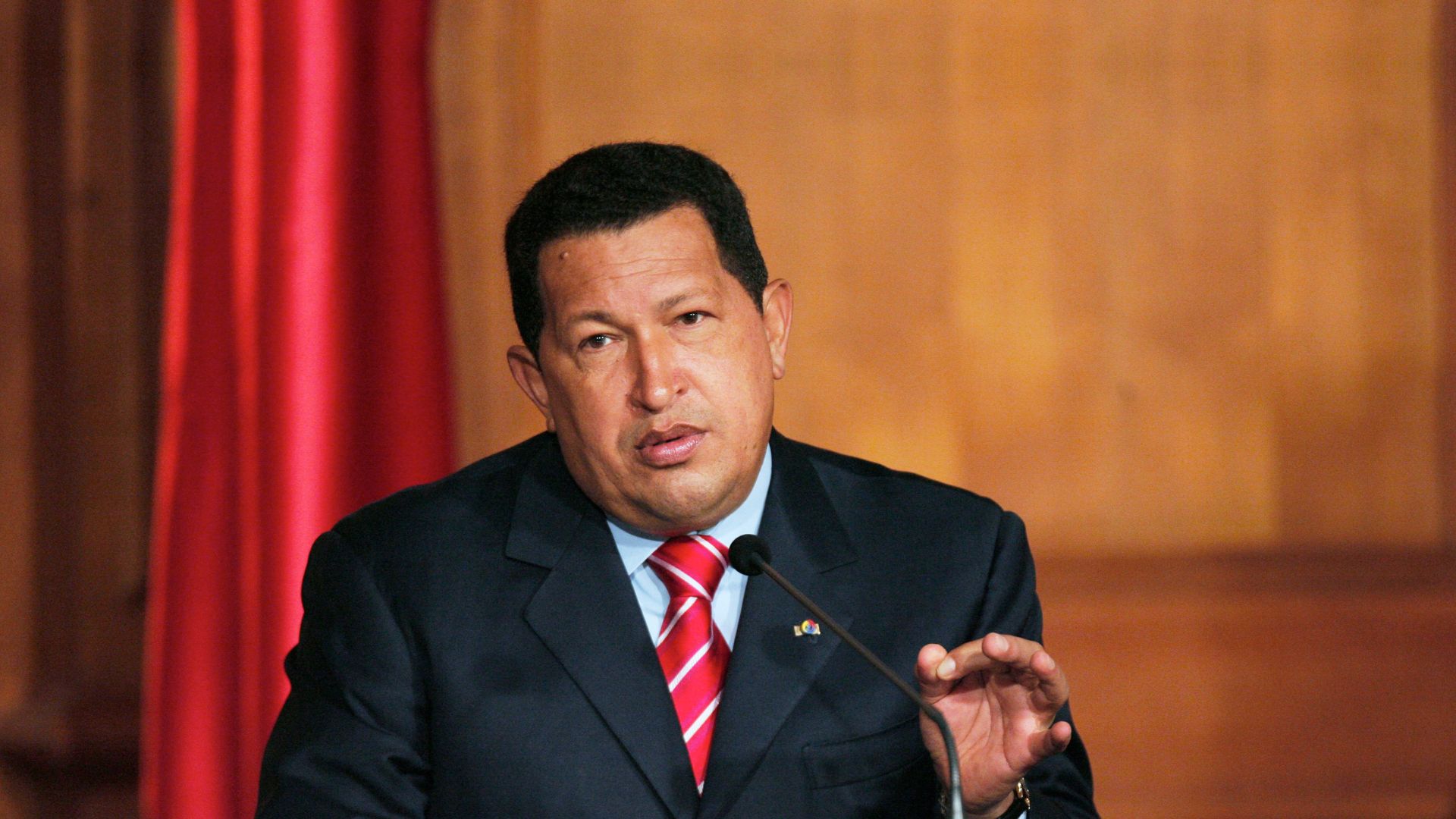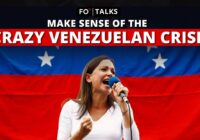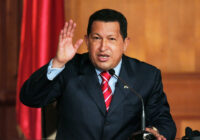Hugo Chávez, Venezuela’s bombastic president, died of cancer in 2013 after having ruled his country for 14 years. Since his death, there has been much speculation about his life; it’s not easy to separate historical facts from myths. For better or worse, his memory has survived.
Many dispute that Chávez was born into sheer poverty, as he had claimed, though he did come from humble means. Gradually, his family’s fortunes changed. They climbed the social ladder. His parents joined one of the two traditional parties in Barinas, his native state. What is certainly true is that since his high school years, Chávez identified himself with those in need. This led him to embark on a military career, which, at the time, was also the proverbial path to prosperity for lower-class Venezuelans.
What brought him to center stage?
While at the military academy, Chávez was contacted by one of his early mentors in high school, a man with ties to the only segment of the left that had not yet entered the democratic fray. Venezuela enjoyed a stable economy for at least two decades. But the oil shock of 1973 put the country in a jumpy situation, despite its natural abundance of oil. The social conditions worsened for many who had been thoroughly accustomed to a life of bonanza.
However, the creation of a secret sect within the army (the Comacates: commanders, captains, and lieutenants), promoted by Chávez and a group of other officers-to-be took place well before the country entered troubling times. So, it is not far-fetched to argue that what was happening in the barracks was more akin to the traditional military disturbances that had taken place in the past, both in Venezuela and elsewhere in the continent. In fact, between 1958—when democracy was established—and 1988, there had been at least 12 failed military coup attempts.
In 1989, Carlos Andrés Pérez was elected for a second time. He had been president before during the oil boom of 1973. In 1989, the country was imperiled by exorbitant debt, early inflationary pressures, a negative real exchange rate and a closed economy. All of these ailments prevented Venezuela from diversifying its economy away from oil. Further, Venezuelans were so attuned to the oil bonanza that any attempt at reform had been demonized.
So, when in 1989 Pérez launched the standard Washington Consensus economic reforms- called the Paquete (the Package) in popular quarters, which included rising transportation fares, all hell went loose. On February 27, 1989, the Caracazo came about. The first uproar happened in a nearby town, but it rapidly extended to the capital. Riots, destruction of property and widespread looting became the name of the game, which prompted the government to bring in the military, as at the time, portions of the police were on strike.
This was the signal the conspirators were waiting for at that time. After those ominous days, they began preparing for the final blow. It eventually came on February 4, 1992. In the wee hours of the day, the country found itself facing the unexpected. Military tanks had entered the streets to oust the elected president. Democratic rule was dwindling and nothing was the same afterward.
The coup failed and Chávez was captured in Caracas. However, the coup attempt struck the heart of the political system and marked the beginning of the end for Pérez. It also made Chávez the man of the day. His captors, in a move that never was quite well explained, had him appear on national television to call for his co-conspirators to cease hostilities. Those may have been the best-used three minutes in all of Latin American history.
Fast forward to 1993: the country elected a new president named Rafael Caldera. He ran as an independent against the party he himself had once founded. One of the first measures of the new government was to liberate the military men that participated in the February 4, 1992 coup, as well as those of an earlier coup in November 1989.
By that time, the party system in Venezuela was in shambles. The two main parties were weakened and Carlos Andrés Pérez was now impeached. When the new election cycle arrived, Chávez, now a free man, ran for office with the support of certain portions of the left. He led a movement of his own creation, supported by sections of the media.
Chávez faced a distraught country struggling to end its economic woes. At this time of crisis, Chávez seized the day. His proposal to change the constitution captured the imagination of the poorer parts of society, already disenfranchised by years of economic suffering. With extremely polarizing rhetoric, he attacked everything built during the democratic era. He promised redemption from, if not revenge against, traditional politicians. Classic Latin American populism was back.
On the shoulders of Bolívar
From the onset of his presidency, Chávez borrowed from and developed upon the ideals of his hero: Simón Bolívar, the Venezuelan leader of independence and champion for a unified Latin America. Chávez was also deeply influenced by Fidel Castro’s Cuba. The Bolivarian Venezuela of Chávez saw Cuba as a new model of grassroots socialism.
Once in power, Chávez and the incoming elite decided to capture power for the long haul. Bit by bit, they dismantled the base of the previous regime and chipped away at the institutions that underpin democracy. This included Petróleos de Venezuela, S.A. (PDVSA), the nationalized oil company, which, despite being state-owned, was one of the most efficient oil enterprises in the world. Chávez’s regime also brought the armed forces, the Supreme Court, and the Electoral Council under its control. Furthermore, Chávez nationalized everything from steel, aluminum and other mineral productions, to hotels, agricultural inputs and chemical industries. This led to the collapse of the local business community.
After capturing power, the highly charismatic Chávez was everywhere. He made daily TV and radio appearances and traveled incessantly. He put on more than just a show though. Chávez also created a nationwide network of public health clinics—many run by Cuban doctors—something that previous democratic governments had failed to do. These clinics became his trademark. Later, Chávez’s regime used these same social programs as clientelistic networks for capturing votes.
Chávez’s victory in 1998 marked the dawn of a new political shift in Latin America. Dubbed the “pink tide,” the new millennium brought other left-leaning leaders such as Argentina’s Néstor Kirchner, Bolivia’s Evo Morales and Ecuador’s Rafael Correa to power. Like both Morales and Correa, Chávez took advantage of this political opening by changing the constitution, seeking indefinite reelections and strengthening regional alliances.
To isolate the US, the Venezuelan leader, along with Brazilian President Luiz Inácio Lula da Silva, founded organizations such as the Union of South American Nations (UNASUR) and the Community of Latin American and Caribbean States (CELAC). High oil prices—at the time, they rose up to $130 per barrel—made funding for such organizations possible.
All that is left is hubris
While Chávez was able to give voice to the voiceless in his country and undermine US influence in the continent, any hope of the coming of a new and just Venezuela soured rapidly. Over time, public debt grew exponentially, exceeding oil revenues, piling up foreign debt and putting Venezuela’s economic stability at risk.
At the same time, scandalous examples of graft and corruption occurred in the politically-controlled PDVSA as well as in the handling of the exchange rate. So, when Chávez decided to run for reelection in 2012, he faced an uphill battle. By this time, he was suffering from cancer, which his Cuban doctors kept as a closely-guarded secret.
In February 2012, the young Henrique Capriles, one of the founders of the young party Primero Justicia (Justice First), was selected in the primaries as the opposition candidate against Chávez. Capriles garnered support from vast numbers of people, both from the electoral coalition—the Democratic Unity Roundtable—and from disenchanted Chavistas.
In the end, the ailing Chávez won by using all the money at his disposal as well as the resources of the state. This left the Venezuelan treasury in very bad shape. Chávez selected his vice president Nicolás Maduro to succeed him. When Maduro assumed power in 2013, after winning a very contested election against Capriles again, the country careered into economic chaos. Public finances were in a mess. Without a drastic reduction in government spending, it was impossible to control inflation. Emulating the populist style of his mentor and predecessor, Maduro, rejected any attempt to put an end to financial madness.
As a result, the economy overheated and hyperinflation emerged. Venezuela had never experienced this before. Two years later, with the Venezuelan Congress controlled by the opposition, Maduro ran into political trouble. He attempted to get out of it by rigging the electoral rules, banning opposition candidates and parties, and creating a parallel congress. people resisted and went to the streets. Repression became the order of the day. Both Human Rights Watch and Amnesty International have documented the litany of human rights violations committed by Maduro’s government.
By 2016, Venezuela faced the worst humanitarian crisis of any country in the entire history of the Americas. Even food and medicine imports were restricted. Nearly 7.4 million Venezuelans fled the country by every conceivable means: by plane, by car, by boat, and even by foot.
In a nutshell, the dreams of a populist soldier did not come true. Some Venezuelans might remember Chávez with a warm heart but his heaven on earth has turned into a living hell. Maybe, just maybe, he is trembling in his tomb, as his romantic dream turns into an ever more barbaric nightmare. [Naveed Ahsan edited this article.]
The views expressed in this article are the author’s own and do not necessarily reflect Fair Observer’s editorial policy.
Support Fair Observer
We rely on your support for our independence, diversity and quality.
For more than 10 years, Fair Observer has been free, fair and independent. No billionaire owns us, no advertisers control us. We are a reader-supported nonprofit. Unlike many other publications, we keep our content free for readers regardless of where they live or whether they can afford to pay. We have no paywalls and no ads.
In the post-truth era of fake news, echo chambers and filter bubbles, we publish a plurality of perspectives from around the world. Anyone can publish with us, but everyone goes through a rigorous editorial process. So, you get fact-checked, well-reasoned content instead of noise.
We publish 2,500+ voices from 90+ countries. We also conduct education and training programs
on subjects ranging from digital media and journalism to writing and critical thinking. This
doesn’t come cheap. Servers, editors, trainers and web developers cost
money.
Please consider supporting us on a regular basis as a recurring donor or a
sustaining member.
Will you support FO’s journalism?
We rely on your support for our independence, diversity and quality.






Comment